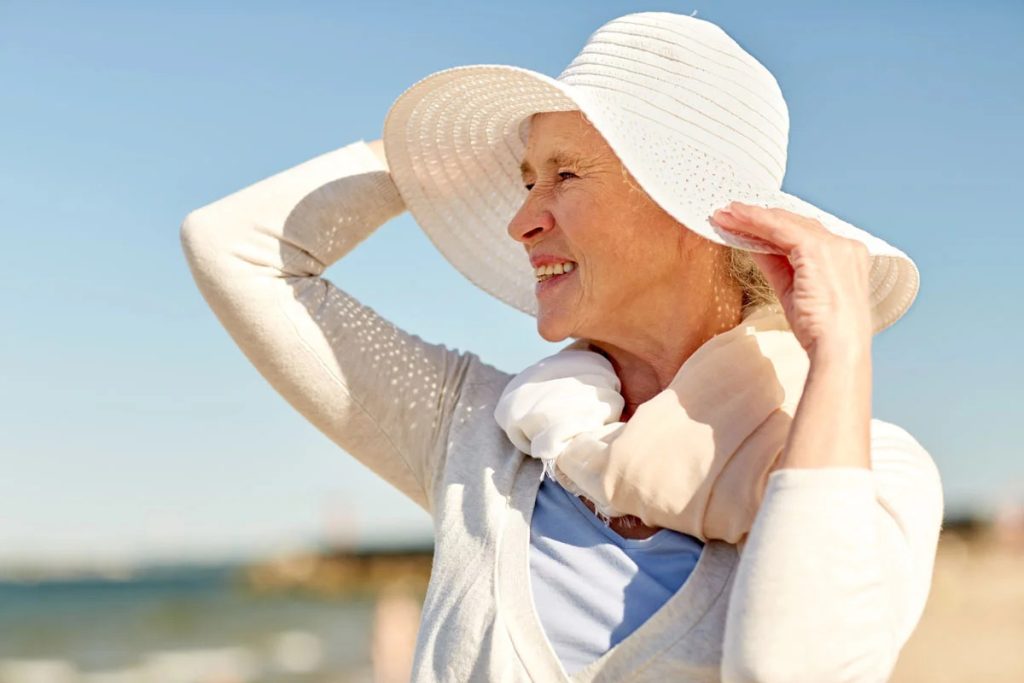As we age, our skin becomes more fragile, making it crucial for seniors to take extra precautions when spending time outdoors. Skin cancer is a serious concern, but with the right knowledge and habits, we can reduce our risk and enjoy the sunshine safely. In this guide, we’ll explore practical sun safety tips tailored specifically for seniors to help prevent skin cancer and maintain healthy skin for years to come.
1. Understand Sun Exposure:
The sun emits harmful ultraviolet (UV) rays that can damage our skin cells and increase the risk of skin cancer. Seniors should be aware that even on cloudy days, UV rays can penetrate clouds and cause harm. It’s essential to take sun protection measures whenever spending time outdoors, regardless of the weather.
2. Choose the Right Sunscreen:
Sunscreen is a vital tool in protecting our skin from sun damage. Look for a broad-spectrum sunscreen with a Sun Protection Factor (SPF) of 30 or higher. Apply sunscreen generously to all exposed skin areas, including the face, neck, ears, and hands. Don’t forget to reapply sunscreen every two hours, especially after swimming or sweating.
3. Cover Up with Clothing:
Wearing protective clothing can provide an additional layer of defense against UV rays. Opt for lightweight, long-sleeved shirts, pants, and wide-brimmed hats to shield your skin from direct sun exposure. Darker colors and tightly woven fabrics offer better protection against UV radiation.
4. Seek Shade During Peak Hours:
The sun’s rays are strongest between 10 a.m. and 4 p.m., so it’s best to limit outdoor activities during these peak hours. Seek shade under trees, umbrellas, or canopies whenever possible to reduce your overall sun exposure.
5. Protect Your Eyes:
Sunglasses are not just a fashion accessory; they also play a crucial role in protecting your eyes from UV radiation. Choose sunglasses that block 100% of UVA and UVB rays and wear them whenever you’re outdoors. Wrap-around styles offer the most coverage and protection for your eyes.
6. Stay Hydrated:
Proper hydration is essential for overall health and can also help keep your skin hydrated and resilient. Drink lots of water throughout the day, especially when you spending time outdoors in the sun.
7. Be Mindful of Medications:
Some medications can increase your skin’s sensitivity to sunlight, making you more prone to sunburn and sun damage. Consult your healthcare provider or pharmacist to understand if any of your medications have photosensitivity side effects. If so, take extra precautions when outdoors and protect your skin accordingly.
8. Perform Regular Skin Checks:
Keep an eye on your skin and monitor for any changes, such as new moles, growths, or spots that itch, bleed, or change in size, shape, or color. Early detection of skin abnormalities is crucial for successful treatment. If you notice anything unusual, consult a dermatologist promptly for evaluation.
Conclusion:
Protecting your skin from the sun’s harmful rays is essential for preventing skin cancer and maintaining skin health as you age. By following these sun safety tips tailored for seniors, you can enjoy outdoor activities safely and reduce your risk of sun-related skin damage. Remember, sun protection is a lifelong commitment, so make it a priority every time you step outside.


